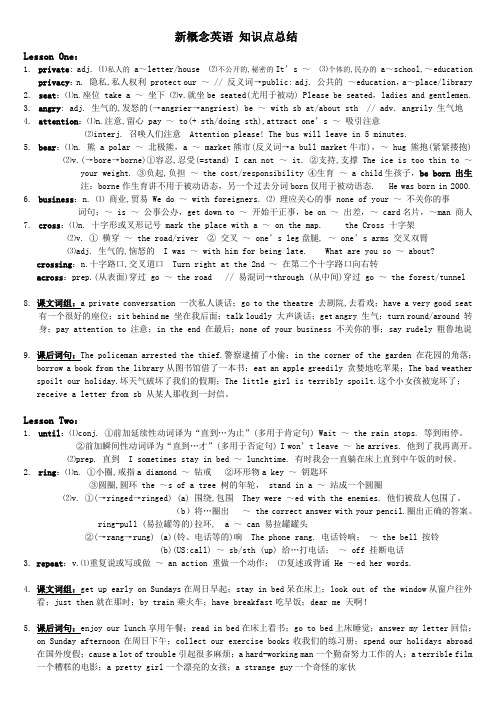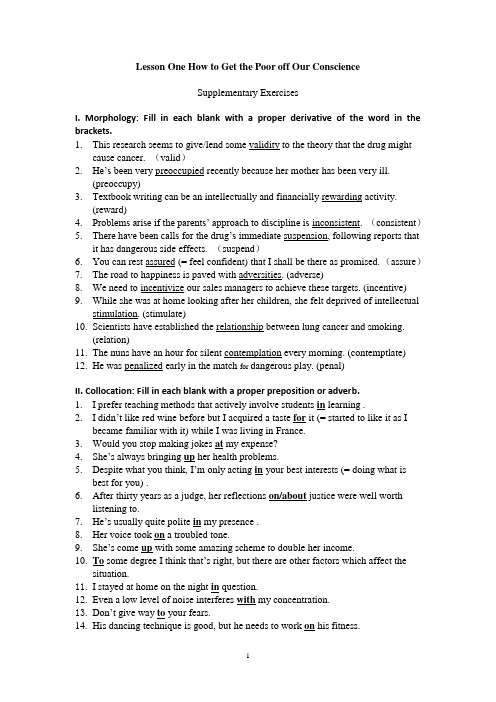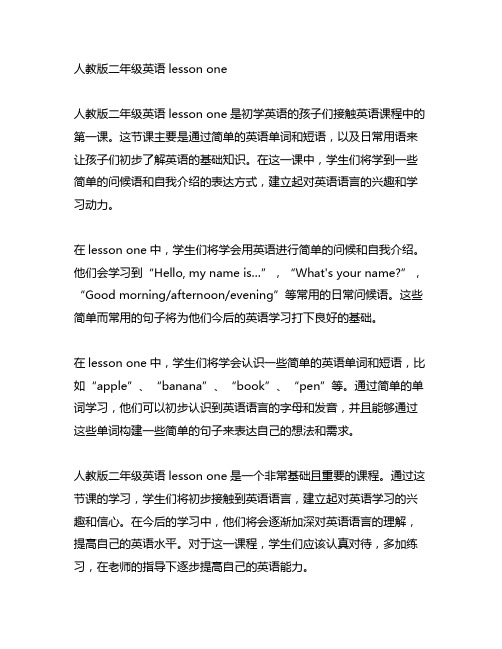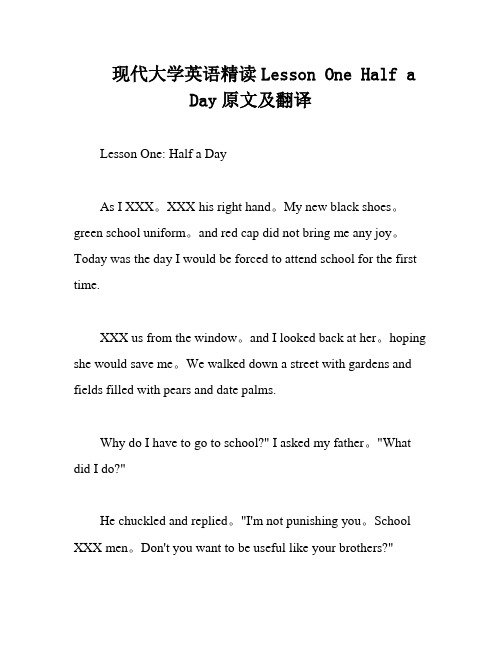Lesson One
新概念英语Lesson one 知识点总结

新概念英语知识点总结Lesson One:1.private: adj. ⑴私人的 a~letter/house ⑵不公开的,秘密的It’s ~⑶个体的,民办的a~school,~educationprivacy:n. 隐私,私人权利 protect our ~ // 反义词→public: adj. 公共的~education,a~place/library2.seat:⑴n.座位 take a ~坐下⑵v.就坐be seated(尤用于被动) Please be seated,ladies and gentlemen.3.angry: adj. 生气的,发怒的(→angrier→angriest) be ~ with sb at/about sth // adv. angrily 生气地4.attention:⑴n.注意,留心 pay ~ to(+ sth/doing sth),attract one’s ~吸引注意⑵interj. 召唤人们注意 Attention please! The bus will leave in 5 minutes.5.bear:⑴n. 熊 a polar ~北极熊,a ~ market熊市(反义词→a bull market牛市),~ hug 熊抱(紧紧搂抱)⑵v.(→bore→borne)①容忍,忍受(=stand) I can not ~ it. ②支持,支撑 The ice is too thin to ~your weight. ③负起,负担~ the cost/responsibility ④生育~ a child生孩子,be born 出生注:borne作生育讲不用于被动语态,另一个过去分词born仅用于被动语态. He was born in 2000.6.business:n. ⑴商业,贸易 We do ~ with foreigners. ⑵理应关心的事 none of your ~不关你的事词句:~ is ~公事公办,get down to ~开始干正事,be on ~出差,~ card名片,~man 商人7.cross:⑴n. 十字形或叉形记号 mark the place with a ~ on the map. the Cross 十字架⑵v. ①横穿~ the road/river ②交叉~ one’s leg盘腿, ~ one’s arms 交叉双臂⑶adj. 生气的,恼怒的 I was ~ with him for being late. What are you so ~ about?crossing:n.十字路口,交叉道口 Turn right at the 2nd ~在第二个十字路口向右转across:prep.(从表面)穿过 go ~ the road // 易混词→through (从中间)穿过 go ~ the forest/tunnel8. 课文词组:a private conversation 一次私人谈话;go to the theatre 去剧院,去看戏;have a very good seat有一个很好的座位;sit behind me 坐在我后面;talk loudly 大声谈话;get angry 生气;turn round/around 转身;pay attention to 注意;in the end 在最后;none of your business 不关你的事;say rudely 粗鲁地说9. 课后词句:The policeman arrested the thief.警察逮捕了小偷;in the corner of the garden 在花园的角落; borrow a book from the library从图书馆借了一本书;eat an apple greedily 贪婪地吃苹果;The bad weather spoilt our holiday.坏天气破坏了我们的假期;The little girl is terribly spoilt.这个小女孩被宠坏了;receive a letter from sb 从某人那收到一封信。
Lesson one (问候与告别)

Lesson one (第一课) 编写:LiciaGreetings and Farewell(问候与告别)1,初次见面打招呼:Tom: How do you do. I am Tom, nice to see you. / 你好,我是汤姆,很高兴见到你Ford: How do you do, Tom. My name is Ford, nice to see you. / 你好,汤姆,我是福特,很高兴见到你。
注意:初次见面打招呼的特殊用语:How do you do2,熟人见面打招呼:Tom: Hello, Ford. How are you? / Nice to see you again. How have you been? / Hello. It’s a lovely day, isn’t it? / Good morning, sir. 你好,福特,最近怎么样?很高兴见到你,最近好吗?你好,今天天气很好,不是吗?先生,早上好。
Ford: I fine, Thank you. And you? / Nice to see you. / Yes, sunny. 我很好,谢谢,你呢?见到你真高兴。
是啊,今天是个大晴天。
Tom: I fine too. (Not bad, very well, good, great, just so-so, about the same as usual, not very well…..)我也很好。
不错,很好,非常好,马马虎虎,和平时差不多,不是很好…..3,送别与告别:Good-bye! / Bye. / See you next time. / See you. 再见Give my best regards to…. 请代我向…..致意I’d better be on my way. 我得上路了Keep in touch. 保持联系Hope to see you again. 希望能再见到你Have a nice day. 祝你愉快I wish you a pleasant journey. / 祝你一路顺风4,情景对话:(让参与者分组,用每一个情景提供的句子编成一组完整的对话,并且加上自己的称谓。
Lesson One 词汇补充练习参考答案

Lesson One How to Get the Poor off Our ConscienceSupplementary ExercisesI. Morphology: Fill in each blank with a proper derivative of the word in the brackets.1.This research seems to give/lend some validity to the theory that the drug mightcause cancer. (valid)2.H e’s been very preoccupied recently because her mother has been very ill.(preoccupy)3.Textbook writing can be an intellectually and financially rewarding activity.(reward)4.Problems arise if the parents’ approach to discipline is inconsistent. (consistent)5.There have been calls for the drug’s immediate suspension, following reports thatit has dangerous side effects. (suspend)6.You can rest assured (= feel confident) that I shall be there as promised. (assure)7.The road to happiness is paved with adversities. (adverse)8.We need to incentivize our sales managers to achieve these targets. (incentive)9.While she was at home looking after her children, she felt deprived of intellectualstimulation. (stimulate)10.Scientists have established the relationship between lung cancer and smoking.(relation)11.The nuns have an hour for silent contemplation every morning. (contemptlate)12.He was penalized early in the match for dangerous play. (penal)II. Collocation: Fill in each blank with a proper preposition or adverb.1.I prefer teaching methods that actively involve students in learning.2.I didn’t like red wine before but I acquired a taste for it (= started to like it as Ibecame familiar with it) while I was living in France.3.Would you stop making jokes at my expense?4.She’s always bringing up her health problems.5.Despite what you think, I’m only acting in your best interests (= doing what isbest for you) .6.After thirty years as a judge, her reflections on/about justice were well worthlistening to.7.He’s usually quite polite in my presence.8.Her voice took on a troubled tone.9.She’s come up with some amazing scheme to double her income.10.To some degree I think that’s right, but there are other factors which affect thesituation.11.I stayed at home on the night in question.12.Even a low level of noise interferes with my concentration.13.Don’t give way to your fears.14.His dancing technique is good, but he needs to work on his fitness.15.Police dogs can discriminate between the different smells.16.This car has an engine replete with the latest technology.17.She was given to staying in bed till lunchtime.18.The unions assured the new owners of the workers’ loyalty to the company.19.They were seduced into buying the washing machine by the offer of a free flightto the United States.20.The pickpocket delicately relieved him of his wallet.21.Her preference is for comfortable rather than stylish clothes.22.The paper charged her with using the company’s money for her own purposes.23.The beauty of air travel consists in its speed and ease.24.When she didn’t answer the telephone, I resorted to standing outside her windowand calling up to her.25.Although richer people may be more likely to express a desire to migrate within agiven country, the reported desire to migrate is also higher in poorer countries as compared with richer countries.26.The company resolved to take no further action against the thieves.27.Sales have fallen badly this year, to the extent that we will have to close some ofour shops.28.I suppose it’s because I live in a city that I have this yearning for open spaces.(yearn)III. Synonym discrimination: Discriminate the differences in meaning between the synonyms and fill in each blank with the best choice.1. The family have a history of mental disorder. (ailment disease disorder) Ailment, disease and disorder all mean a deranged bodily state usually associated with or amounting to a loss of health. Disease in its usual and broadest use implies an impairment of the normal state of the living body or of one or more of its parts marked by disturbance of vital functions and usually traceable to a specific cause. Disorder is commonly interchangeable with disease but typically it stresses the disordered state without regard to the cause. Ailment often suggests a trivial or chronic disorder.2. Should the opportunity arise, I’d love to go to China. (arise rise)Rise and arise mean to move or come up from a lower to a higher level. Rise is used in reference to persons or animals that get up from a lying or sitting position or to things that seem to come up into view or to lift themselves up. Arise comes close to rise but is somewhat more rhetorical or poetic.3. They were debating the proposition that “All people are created equal”. (proposal proposition)Proposal and proposition are comparable when they denote something which is proposed to another for consideration. Proposal usually carries a clear suggestion of the act of proposing; thus one receives a proposal, or entertains a proposal, or listens to a proposal. It also commonly implies an offer. Proposition applies primarily to ausually affirmative statement that is propounded for discussion, argument, proof, or disproof.4. The final answer to this question is still to be found. (last eventual final) Last, eventual and final are comparable when they mean following all the others in time or order or in importance. What is last comes at the end of a series, especially of things of the same kind or class; the term usually implies that no more will follow or have followed. What is final definitely closes a series or process not only because it is the last in order of individuals or details but because it is decisive or conclusive. What is eventual is bound to follow as the final effect of causes already in operation or of causes that will be operative if a given or understood contingency occurs.5. The artisan, for example, ranks no doubt lower than the professional man; but no one maintains that he is a different kind of being. (maintain assert justify) Maintain, assert and justify are comparable when they mean to uphold as true, right, just, valid, or worthy of notice or acceptance in the face of opposition. When this implication is the only one, maintain usually means to argue in the spirit of one who does not admit any weakness in his contention. Often, however, the term additionally implies persistence or insistency in upholding in defiance of all opposition. Assert so strongly implies a determination to make others accept or recognize what one puts forward as the truth, or as a claim, or as a right, that it often suggests aggressiveness or obtrusiveness. Justify implies that the thing concerned can no longer be oppsed or ignored because it has been conclusively shown to be true, valid, or proper by irrefutable arguments or on inescapable grounds, such as its consequences or its successful operation.6. Able boys and girls will submit willingly to severe discipline in order to acquire some coveted knowledge or skill. (able competent capable qualified)Able, competent, capable and qualified are close synonyms when they denote having marked power or fitness for work and are used attributively. Able suggests ability markedly above the average; it often connotes power of mastery; it does not exclude the connotation of promise even when the emphasis is on performance. Capable stresses possession of qualities such as adaptability, resourcefulness, versatility, industry, or efficiency and seldom indicates, apart from its context, the specific ability involved. Competent and qualified are used especially to characterize a person or his activities in relation to a specific calling. Competent implies the ability to satisfy capably all the special demands or requirements of a particular situation, craft, or profession, but it does not necessarily imply, as qualified usually does, compliance with set standards such as special training and the testing of one’s competence at the end of such training.7. Few men are placed in such fortunate circumstances as to be able to gain office. (Get obtain procure gain )Get, obtain, procure and gain are often interchangeable when they mean to come intopossession of. Get is very general in its meaning and simple and familiar in its use. Obtain may suggest that the thing sought has been long desired or that it has come into possession only after the expenditure of considerable effort or the lapse of considerable time. Procure is likely to suggest planning and contriving over a period of time and the use of unspecified or sometimes questionable means. Gain often implies competition in acquiring something of value.8. The universe is presumed to contain many other planets with some form of life. (presuppose presume assume)Presuppose, presume and assume are comparable when they mean to take something for granted or as true or existent especially as a basis for action or reasoning. Presuppose, the most inclusive of these words, need not imply dubiousness about what is taken for granted. Presume may imply conjecture but ordinarily carries the implication that whatever is taken for granted is entitled to belief until it is disproved. Assume stresses the arbitrary acceptance as true of something which has not yet been proved or demonstrated or about which there is ground for a difference of opinion. 9. The hotel is in a tranquil rural setting. (calm tranquil peaceful)Calm, tranquil and peaceful all mean quiet and free from all that disturbs or excites. Calm is primarily applied to sea or weather, usu conveys an implicit contrast with its opposite: stormy, and suggests freedom, real or assumed, from agitation of whatever sort. Tranquil implies a more settled composure, a more inherent quiet, than calm with less suggestion of previous agitation overcome. Peaceful implies repose or the attainment of undisturbed tranquility.。
lesson one 单词

an [æn] art. 一(在元音字母前)a art. 一;任一;每一the [ði] art. 这;那adv. 更加(用于比较级,最高级前)student ['stju:dənt] n. 学生;学者is [iz] v. 是(be的三单形式)apple ['æpl] n. 苹果;[俚]家伙John n. 约翰(男子名)green [ɡri:n] n. 绿色;青春adj. 绿色的;青春的vt. 使变绿色vi. 变绿色bike [baik] n. 自行车;脚踏车New Y ork 纽约No. abbr. 号码;编号(等于number)fourteen ['fɔ:'ti:n] num. 十四adj. 十四的middle ['midl] adj. 中间的,中部的;school [sku:l] n. 学校;tree [tri:] n. 树banana [bə'nɑ:nə] n. 香蕉;factory ['fæktəri] n.工厂She [ʃi:] pron. 她(主格)three [θri:] n. 三,三个num. 三adj. 三的,三个的has [hæz] vt. 有;family ['fæmili] n. 家庭group [ɡru:p] n. 小组team [ti:m] n. 队police [pə'li:s] n. 警察clothing ['kləuðiŋ] n. 衣服furniture ['fə:nitʃə] n. 家具wood [wud] n. 木料meat [mi:t] n. 肉wine [wain] n. 酒gas [ɡæs] n. 气体piece [pi:s] n. 片,枝,块,张cup [kʌp] n. 杯bag [bæɡ] n. (袋),bottle ['bɔtl] n. (瓶)等表示计量的名词。
人教版二年级英语lesson one

人教版二年级英语lesson one人教版二年级英语lesson one是初学英语的孩子们接触英语课程中的第一课。
这节课主要是通过简单的英语单词和短语,以及日常用语来让孩子们初步了解英语的基础知识。
在这一课中,学生们将学到一些简单的问候语和自我介绍的表达方式,建立起对英语语言的兴趣和学习动力。
在lesson one中,学生们将学会用英语进行简单的问候和自我介绍。
他们会学习到“Hello, my name is…”,“What's your name?”,“Good morning/afternoon/evening”等常用的日常问候语。
这些简单而常用的句子将为他们今后的英语学习打下良好的基础。
在lesson one中,学生们将学会认识一些简单的英语单词和短语,比如“apple”、“banana”、“book”、“pen”等。
通过简单的单词学习,他们可以初步认识到英语语言的字母和发音,并且能够通过这些单词构建一些简单的句子来表达自己的想法和需求。
人教版二年级英语lesson one是一个非常基础且重要的课程。
通过这节课的学习,学生们将初步接触到英语语言,建立起对英语学习的兴趣和信心。
在今后的学习中,他们将会逐渐加深对英语语言的理解,提高自己的英语水平。
对于这一课程,学生们应该认真对待,多加练习,在老师的指导下逐步提高自己的英语能力。
对我个人而言,人教版二年级英语lesson one的重要性在于,它是孩子们初次接触到英语学习的开始,为他们未来的英语学习奠定了基础。
在学习这一课程时,我会注重帮助学生们掌握基础的英语表达能力,同时激发他们学习英语的兴趣,让他们乐于学习英语,建立自信心。
我会引导学生通过多种方式来学习、练习lesson one中的内容,比如通过唱歌、玩游戏等形式来加深他们对英语的记忆和理解。
总的来看,人教版二年级英语lesson one是孩子们学习英语的第一步,它的重要性不言而喻。
现代大学英语精读Lesson One Half a Day原文及翻译

现代大学英语精读Lesson One Half aDay原文及翻译Lesson One: Half a DayAs I XXX。
XXX his right hand。
My new black shoes。
green school uniform。
and red cap did not bring me any joy。
Today was the day I would be forced to attend school for the first time.XXX us from the window。
and I looked back at her。
hoping she would save me。
We walked down a street with gardens and fields filled with pears and date palms.Why do I have to go to school?" I asked my father。
"What did I do?"He chuckled and replied。
"I'm not punishing you。
School XXX men。
Don't you want to be useful like your brothers?"XXX from my home and thrown into a large。
high-walled building would do me any good.When we reached the gate。
the courtyard XXX me to go in alone and join them。
XXX to his hand。
he urged me to be brave and start this new chapter of my life。
高中英语真题-LessonOne

高中英语真题:LessonOneSection One:Tapescript.Dialogue 1:Hello, I want a cab.OK. What address is it?1120 East 32nd Street.Right. The cab will be there in a few minutes. Dialogue 2:What’s your job?I’m an accountant.Oh! Do you enjoy it?No. I don’t really like it. It’s boring.Dialogue 3:Where do you come from?Indonesia.Oh! Which part?Jakarta.Really?Dialogue 4:Can you speak German?Yes, I can. I speak it very well.Where did you learn it?I lived in Germany when I was a child.What else can you speak?Well, I know a little Italian.Dialogue 5:I think a businessman should be good-looking. No, I don’t agree.Dialogue 6:Would you like a drink?No, thank you. I don’t drink.Are you sure?Yes. I’m quite sure. Thank you very much. What about a soft drink then?Oh, alright. Lemonade would be fine. Dialogue 7:Thank you very much for the meal.Not at all. I’m glad you could come.You must come and have a meal with me some time. Yes. That would be nice.Dialogue 8:Have you heard about the Prime Minister?No.She's gone to China!Really!Dialogue 9:How do you spell interesting?I-N-T-E-R-E-S-T-I-N-G.Thank you very much.Dialogue 10:Would you mind passing the salt, please? Certainly.Section Two:Tapescript.Discussion.Tim talked to Harry about the lecture.Harry: What did you think of the lecture?Tim: I thought it was very interesting.Harry: Did you really?Tim: Yes, didn’t you?Harry: Certainly not. I thought he talked a lot of rubbish.Tim: So you think you know more than he does.Harry: Well, take coal for instance.Tim: What about it?Harry: Coal won’t become important again.Tim: Why not?Harry: It’s too dirty. They won’t be able to find people to work do wn coal mines in the future.Tim: They’ll invent new kinds of machinery.Harry: Nonsense. The only sort of power they’ll use in the future is atomic power.Interview.A reporter from a local newspaper is interviewing some student s on the subject of students and money.Reporter: Excuse me, are you a student?Student 1: Yes, I am.Reporter: Forgive my asking you, but do you have to take a part -time job in the holidays?Student 1: Not really. My parents are fairly well off, so I get an allowance from my father.Reporter: You're lucky, aren’t you?Student 1: I suppose so.Reporter: What about you? Are your parents wealthy?Student 2: No, certainly not.Reporter: Do you work during the holidays?Student 2: Well, last Christmas I did two weeks as temporary p ostman, then in the summer I spent four weeks fruit picking, an d I do a bit of baby-sitting, so I manage.Reporter: Thank you.Section Three:Dictation.Dictation 1:My name is Robert. I am eighteen years old and I am French. I am not married. Sylvia is small and fair. She is seventeen and s he is a student.Dictation 2:The tall boy with fair hair is eighteen years old and he comes from Sweden. He works in a record shop.The small boy with dark hair is seventeen. He is Spanish, but h e does not live in Spain. He lives in France. He works in a hotel.LessonOneSection One:Tapescript.Dialogue 1:Hello, I want a cab.OK. What address is it?1120 East 32nd Street.Right. The cab will be there in a few minutes.Dialogue 2:What’s your job?I’m an accountant.Oh! Do you enjoy it?No. I don’t really like it. It’s boring.Dialogue 3:Where do you come from?Indonesia.Oh! Which part?Jakarta.Really?Dialogue 4:Can you speak German?Yes, I can. I speak it very well.Where did you learn it?I lived in Germany when I was a child.What else can you speak?Well, I know a little Italian.Dialogue 5:I think a businessman should be good-looking.No, I don’t agree.Dialogue 6:Would you like a drink?No, thank you. I don’t drink.Are you sure?Yes. I’m quite sure. Thank you very much.What about a soft drink then?Oh, alright. Lemonade would be fine.Dialogue 7:Thank you very much for the meal.Not at all. I’m glad you could come.You must come and have a meal with me some time. Yes. That would be nice.Dialogue 8:Have you heard about the Prime Minister?No.She's gone to China!Really!Dialogue 9:How do you spell interesting?I-N-T-E-R-E-S-T-I-N-G.Thank you very much.Dialogue 10:Would you mind passing the salt, please?Certainly.Section Two:Tapescript.Discussion.Tim talked to Harry about the lecture.Harry: What did you think of the lecture?Tim: I thought it was very interesting.Harry: Did you really?Tim: Yes, didn’t you?Harry: Certainly not. I thought he talked a lot of rubbish.Tim: So you think you know more than he does.Harry: Well, take coal for instance.Tim: What about it?Harry: Coal won’t become important again.Tim: Why not?Harry: It’s too dirty. They won’t be able to find people to work down coal mines in the future. Tim: They’ll invent new kinds of machinery.Harry: Nonsense. The only sort of power they’ll use in the future is atomic power.Interview.A reporter from a local newspaper is interviewing some students on the subject of students and money.Reporter: Excuse me, are you a student?Student 1: Yes, I am.Reporter: Forgive my asking you, but do you have to take a part-time job in the holidays? Student 1: Not really. My parents are fairly well off, so I get an allowance from my father. Reporter: You're lucky, aren’t you?Student 1: I suppose so.Reporter: What about you? Are your parents wealthy?Student 2: No, certainly not.Reporter: Do you work during the holidays?Student 2: Well, last Christmas I did two weeks as temporary postman, then in the summer I sp ent four weeks fruit picking, and I do a bit of baby-sitting, so I manage.Reporter: Thank you.Section Three:Dictation.Dictation 1:My name is Robert. I am eighteen years old and I am French. I am not married. Sylvia is small a nd fair. She is seventeen and she is a student.Dictation 2:The tall boy with fair hair is eighteen years old and he comes from Sweden. He works in a rec ord shop.The small boy with dark hair is seventeen. He is Spanish, but he does not live in Spain. He lives in France. He works in a hotel.。
Lesson One 第一课

2.语法方面——时态的用法
(2)时态 科技英语中的常用时态有: 一般现在时(最常用) 一般过去时(科技发展史) 现在完成时 (某些科技报告、杂志)
2.语法方面——广泛使用被 动
(3)广泛使用被动的原因: 尽量避免第一、二人称,以免造成主 观臆断。 主要信息提前,通过主语传递主要信 息
2.语法方面——广泛使用被 动
Ⅵ 同义词 synonym differentiate and analyse
electrical 电的,与电有关的,电气科学的,与用电有 关的事物,被修饰词本身一般不能带电。 Example: electrical engineer, electrical energy Buy an electric guitar and an electrical book for me. Exception 例外 Electric(al) engineering /engineer / capacity 电气工程/ 电气工程师 / 电容
Ⅵ 同义词 synonym differentiate and analyse
3.factory,plant, works, mill的区别 factory 最普通的工厂用语 factories and stores 工厂和商店 factory building 厂房
Ⅵ 同义词 synonym differentiate and analyse
Example: The capacitance of a capacitor is measured in farads. 电容器的电量以法拉为单位来测量。 We measure the capacitance of a capacitor in farads. 我们以法拉为单位来测量电容。
- 1、下载文档前请自行甄别文档内容的完整性,平台不提供额外的编辑、内容补充、找答案等附加服务。
- 2、"仅部分预览"的文档,不可在线预览部分如存在完整性等问题,可反馈申请退款(可完整预览的文档不适用该条件!)。
- 3、如文档侵犯您的权益,请联系客服反馈,我们会尽快为您处理(人工客服工作时间:9:00-18:30)。
because, since 和for 的区别
because 用于未知的原因,语气最强;why提 问,回答只能用because e.g. John didn’t go to school because he was ill. since 用于已知的原因,语气较because弱 e.g. Since you know English is very important , you’d better work hard at it. for 表示补充说明的理由, 而且for引导的从句一 般不放在句子的开头,前面要加逗号 e.g. I decided to stop and have lunch, for I was feeling quite hungry.
Vocabulary I
4. local a.当地的 local people/ calls/ time locate vi. 位于 be located in / on/ to 范围内 / 领土接壤 /范围外 in e.g. Shanghai is located _____the east of China. Japan is located ____ the east of China. to Russia is located ____ the north of China. on = be/lie in/on/to location n.位置
Vocabulary I
since 自从……以来 1. since + 时间点 9:00, last year, October, 2008 , an hour ago …… for + 时间段 9 minutes, two years, a long time, an hour…… 2. since + 句子 (时间状语从句) 主现完从过 (主句是时间可用一般现在时) e.g. We have been to Beijing twice since we went there last year. Since he came to Shanghai, it is/has been 5 years.
Voห้องสมุดไป่ตู้abulary II
9. response n. 回答;反应 = answer = reply in response to 作为对……的答复 = in answer/ reply to e.g. He opened the door in response to a knock. responsible a. 有责任的 be responsible for 对……负责 = be in charge of = take charge of e.g. Mary is responsible for the school sports meeting. responsibility n. 责任感 e.g. Keeping our classroom clean is our responsibility. respond v. 作出反应 e.g. Did she respond to your letter?
选择合适的答案
1、Why was he late for school? A ____he got up too late. A、Because B、Since C、For B 2、_____ everyone is here, let’s begin our meeting. A、Because B、Since C、For C 3、The days are short, _____ it is now December. A、because B、since C、for
Vocabulary I
5. since conj./prep. 既然;由于 (引导原因状语从句) = now that = as e.g. Since you’re very busy, I won’t trouble you. You’d better take a rest since you’ve got a bad cold. 将下列句子用since连接 (P40) since (1) Since you are studying English, you should learn about the differences between Chinese and Western cultures and customs. (2) Since it was Zhang Jun’s first visit to London, Helen showed him around the city. (3) Since Zhang Jun met Helen’s parents for the first time, he shook hands with them.
形式主语 真正的主语
need v./n. necessarily
e.g. It’s important to keep healthy. = To keep healthy is important.
It is + a. + for sb. to do sth. (描述事情的,说明句尾动词不定式特征的形容词 如:important, difficult, expensive, dangerous, hard, possible…… ) It is + a. + of sb. to do sth. (表达人的意志、品格和性格的形容词 如:kind, foolish, good, clever, honest, nice, polite, careful……) 用for 和of 填空 for It’s important ____ us to learn English well. It’s very kind ____ you to help me. of = You are kind to help me.
Vocabulary I
2. communicate vi. 交流 communicate with sb. 与某人交流 = keep in touch with sb. e.g. Can you communicate with foreigners in English? With the Internet, we are able to communicate with each other more easily. communication n. 交流
Unit Two Lesson One
Visiting a British Family
Vocabulary I
1. shake hands with 与……握手 (shook, shaken) e.g. They are shaking hands with each other. The hostess shook hands warmly with the guests. shake one’s head 摇头 反:nod one’s head 点头
Vocabulary I
3. polite a. 有礼貌的 be polite to sb. 对某人有礼貌 e.g. You should be polite to everyone. It is not polite to be too late for a party. 反: impolite
Vocabulary II
7. be busy doing sth. 忙于做某事 e.g. My mother is busy cleaning the room. be busy with sth. 忙于某事 e.g. I was busy with my homework. business n. 生意 e.g. It’s none of your business. 不关你的事。 businessman n.男商人 businesswoman n.女商人
Vocabulary II
ad. 6. necessary a. 必要的 e.g. It’s necessary for us to study hard. = We need to study hard. It’s necessary to take an active part in sports. Sleep is necessary for health. It is + a. + to do sth. 做某事是……
Vocabulary II
8. receive vt. 收到;得到 = get receive one’s letter 收到某人的来信 = receive a letter from sb. = hear from sb. e.g. Jack’s father was glad to receive his letter. = Jack’s father was glad to receive a letter from him. = Jack’s father was glad to hear from him.
